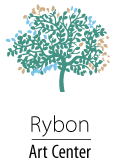Second Rybon International Artists' Workshop
10 - 25 November 2016 - Tehran, Iran
In Collaboration with Kooshk Residency and deegar Platform
Open Day:
25 November 2016
An international, independent and artist-led
institute based in Tehran, Rybon Art Center hosted the second Rybon international
artists’ workshop. The program started on November 10th with Lynn
Kodeih from Lebanon, Nicene Kossentini from Tunisia, Maria Kapajeva from
Estonia, Wojciech Gilewicz from Poland, and Irfan Hasan from Pakistan, as well
as Mojtaba Tabatabaie, Neda Razavipour, Mojtaba Amini, Seyed Amin Bagheri, and
Nastaran Safaie, and lasted until November 25th.
The program started off with an opportunity for
the participants to get acquainted. For accustoming foreign artists to the
cultural and artistic milieu of Tehran, the next two days was dedicated to the
visiting of galleries, bookstores, and museums. In light of the fact that the
idea of this model of workshops is mainly based on maximization of interaction
and dialogue between the artists, some hours were allotted to introducing the
artists. During these sessions, each of the artists talked about their artistic
backgrounds, sharing their mentalities and experiences, which facilitated the
process of the artists knowing each other’s artistic behaviors, sowing the
seeds of collaboration. In the meantime, they chose their desired studios in deegar
platform—one of the partners of the
program that provided the work-space for the artists for this year’s workshop. The
platform had 5 studios and other work-spaces, each of which were selected
according to what the artists’ techniques necessitated. Two to three artists
started to work simultaneously in each studio. Rybon’s team put its best effort
into making the air ripe for dialogue and interchange of ideas, so that the
artists would come to a decision on their final concept. Of course, the
interaction itself was far more important than the end results. So nothing
hampered the cordial conversations. The exploration of Tehran and the Persian
world led the artists to choose cultural subject-matters related to Tehran,
whether directly or subtly. This, to a large degree, is related to the artists’
techniques and behavior, because, after all, it is they who have to find their
orientation during the two weeks.
Two panel discussions were also scheduled. One
were dedicated to a review of the 2012 workshop, for which Iranian artists of
the previous program were invited. In the session, Hamed Jaberha interviewed
Katayoun Karami, Mahmoud Mahroumi, Hamed Rashtian, Babak Kazemi, and Pooneh
Oshidari, on the experience of the previous workshop and its impacts, which was
very significant for the Rybon team and the artists of this year’s program. The
second session, however, was about the idea of this model of workshops. It was
held with the presence of Sohrab Mahdavi, Tehran based art critic, Alessio
Antoniolli, Director of Gasworks & Triangle Network, Janan Nozari, one of
the coordinators of this year’s program, and Hamed Jaberha, who hosted the
session.
The second week was an open studio: the audience
could come to deegar platform, getting to know the artists, exploring the
process of their works, and asking questions. At the end of the two weeks, one
final day was scheduled for the program, during which the doors of the studios
were open for seven hours, so that many enthusiasts could come in and
appreciate the program and deegar platform.
The frosty Friday of Tehran had special guests,
though. Lecturers and participants of Res Artis meeting, held simultaneously
with the program in three intense days, dedicated their last hours in Tehran to
the visiting of art events. Due to the fact that the artists needed time and a
space in which they could concentrate on their works, it was not possible for
people to come and watch them at work, so this final day was a good opportunity
to invite artists, journalists, and critics to get to know the program and its
artists.
The program met Rybon’s expectations in every way.
As a matter of fact, holing such programs in two weeks is a risky business,
especially when the invited artists are chosen from a variety of disciplines,
ages, experiences, nationalities, and from a much larger list. One of the most
essential factors of the selection and invitation, is the experience of the
artists, which means the organizing team has to expect the worst case scenarios
in terms of challenges and probable mishaps. The Rybon team did its best to get
the most desirable outcome. Meanwhile,
carpets, traditional musical
instruments, music albums, and Persian books were as happy as we were, as the
program concluded with a smile of satisfaction, making the farewell a little
less difficult. Next wish: the third program. The program was coordinated by
Hamed Jaberha, Negin Mahzoun and Janan Nozari.
By Hamed Jaberha
As an international, nonpolitical, autonomous initiative, Rybon Art Center aims to promote innovation and experimentation of art among established and emerging artists and to explore the possibilities of exchanging ideas and knowledge across ethnic, regional and artistic borders.
